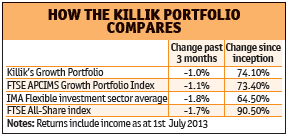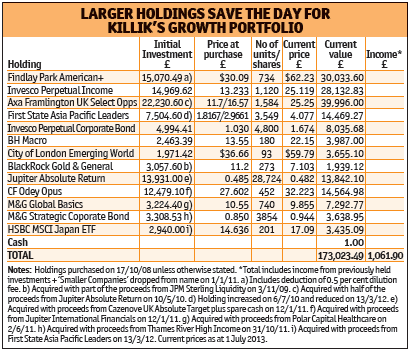Larger holdings save the day for Killik's Growth Portfolio
19th July 2013 16:54
by Helen Pridham from interactive investor
Share on
Money Observer's hypothetical growth portfolio slipped back slightly in the second quarter as markets wobbled. Its manager, Mick Gilligan, head of research at stockbroker Killik & Co, tells Helen Pridham why some holdings kept it ahead of the competition.
The second quarter of 2013 started off well for the hypothetical growth portfolio, but it was hit by the fall in global stockmarkets towards the end of May when it emerged that the Federal Reserve is considering a reduction in quantitative easing. However, after the initial negative reaction, markets started recovering again and by the end of the quarter the FTSE All-Share index was showing a net fall of just 1.7%.

A key reason for its resilience was the performance of two of its largest holdings, which were among five funds in the portfolio that produced a positive return over the quarter. and Findlay Park American make up 16% and 17% of the portfolio respectively; over the quarter the former returned 2.3% while the latter was up 1.2%.
Invesco Perpetual Income takes a defensive stance. Fund manager Neil Woodford has always focused on companies he feels can be relied on to deliver attractive cash flows, earnings and dividend growth, even in tough economic environments. Gilligan also points out: "The fund's sector exposures were particularly beneficial. Pharmaceuticals, its largest, and telecoms both performed strongly."
Meanwhile, Findlay Park American's stock selection stood it in good stead, but it also benefited from the relatively strong US stockmarket and a slightly strengthening dollar.
The portfolio's highest gains were recorded by , which returned 6.4%, and , which rose 5%; but both are relatively modest holdings in the portfolio at around 2% each, so their positive impact was limited. As Gilligan explains: "The bulk of BH Macro's gain came as a result of its price moving from a 2% discount to a 3% premium over the quarter. This trust has tended to trade at a premium for most of its life - it is a quality operator in the hedge fund space and buyers saw the discount as a buying opportunity."

The only other holding which produced a positive return over the quarter was the globally invested , managed by Crispin Odey. Its exposure to financials helped its performance of late.
The worst-performing holding was , which plummeted nearly 40% as a result of the fall in the gold price. Fortunately in this case, the fund is only a small part of the portfolio, so the impact of the fall on the overall return was muted. The other main faller over the quarter was , which fell 9% after its discount widened due to the flow of bad news from emerging markets.
Memories of the financial crisis in 2008 underpinned the markets' fall in May, according to Gilligan. "The memories of this period are still too recent, and investors are not prepared to take risks. I think markets will recover from here, but we will then see a more meaningful pull-back and so I will be looking at de-risking the portfolio, maybe in 12 months' time. There are still a lot of unresolved issues in the economy."